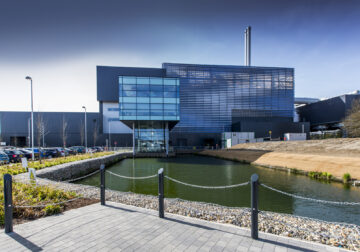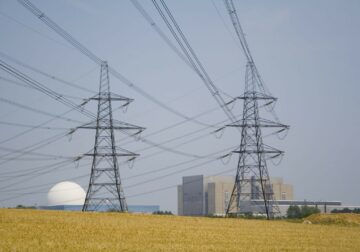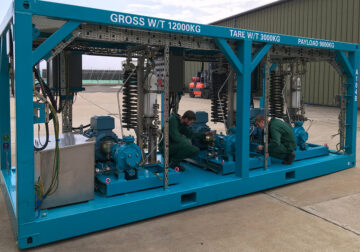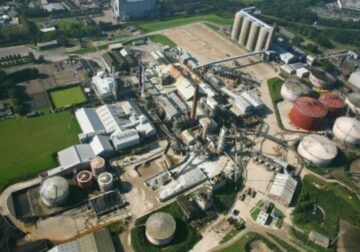Amarinth’s strip, report, refurbishment, or replacement service can refurbish or replace most API 610 and ISO 5199 pumps. Delivered by trusted and reliable experts, it offers best advice and the most cost-effective solution considering the specific needs of each customer.
Strip and report
The first step is a detailed mechanical and hydraulic assessment to evaluate the viability of refurbishing a pump or determine if it would be more cost-effective to replace it. The assessment looks at the condition, working life and maintenance regime of the pump and the duties and requirements, such as the flow, head, power, NPSH and materials, in addition to the physical pipework, fittings and baseplates that may need alteration.
By offering both the option of either replacing the pump, which can be dimensionally and hydraulically the same as the original pump, or refurbishing the pump with new, often improved components, Amarinth is ideally placed to offer the customer best advice.
Once the report is complete, Amarinth discusses with the customer how to best meet the technical and economic constraints to arrive at an agreed
refurbishment or replacement solution.
Refurbishment
If refurbishment is a viable option, Amarinth’s standard procedure then ensures that all important components are replaced, and knowledgeable engineers carefully inspect all non-replacement items for wear and to make sure they are within tolerance. In some cases, using modern design and manufacturing tools alongside the skills of its own pump design engineers, Amarinth can re-engineer components, rather than just replicate them, improving on the original design and increasing the pump’s reliability or performance. Whole new interchangeable sub-assemblies can even be designed and manufactured to resolve outstanding issues operators are experiencing with their existing pumps.
Following the extensive overhaul, pumps are tested at Amarinth’s in-house facility to certify them to the same standards as a new pump, giving customers peace of mind that the refurbished pumps will operate reliably for at least another 20 years. Customers also benefit from long-term support from Amarinth and a readily available supply of spares.
Replacement
For obsolete pumps, such as when the OEM has ceased trading, and it is not economically viable to refurbish the pump, or the customer would rather replace it with a new pump, Amarinth will use its expertise to best match the hydraulic performance of the existing pump with a new Amarinth one and offer a bespoke solution to ensure the new pump is as dimensionally interchangeable as possible with the existing one.
This ensures that no changes required to the existing processes as all hydraulic specifications are the same, and that the new pump will fit within the existing footprint and connect to the same pipework which reduces the cost of any changes to associated equipment, and importantly minimises downtime.
Single point of contact
A single point of contact at Amarinth coordinates all after sales service work, distributing and managing tasks internally to ensure the quickest possible turnaround of projects for customers, thereby minimising downtime and disruption.
For organisations in the United Kingdom where there is a drive to extend the life of assets, they can now work closely with Amarinth as a local pump provider to either refurbish their existing pumps or replace them along with full support and spares for decades to come, delivering peace of mind to plant operators that they are getting the most cost-effective solution with the least disruption.
Great Blakenham – incinerator pumps
The Great Blakenham Energy from Waste (EfW) plant in the UK is owned and operated by Suez. Opened in 2014, the £180million incinerator plant takes every single bag of general refuge from households and businesses in the county, preventing any rubbish going to landfill. With an operational capacity of 269,000 tonnes per annum, the burning process creates enough energy for electricity to be pumped to 30,000 homes.
When the existing multistage pumps started to require more than general maintenance, Suez reviewed the options open to them with their current supplier. Having tight budget constraints, the high prices of new pumps proposed by the supplier replacement of the pumps was not an option and the existing supplier did not offer a service to refurbish the pumps.
Suez turned to Amarinth as a local pump provider for advice. Amarinth was able to identify the problems with the existing pumps that were causing the accelerated wear and high maintenance needs. Amarinth proposed a cost-effective solution of designing and manufacturing new internal components so the pumps would better handle the process. The new components returned the pumps to full operational efficiency, and they now work reliably with Amarinth providing any spares that are necessary during routine maintenance.

EDF – nuclear power station
The Sizewell B nuclear power station on the Suffolk coast, operated by EDF, was commissioned in 1995 and is the only Pressurised Water Reactor in the United Kingdom. Last year Sizewell B generated low carbon electricity for 2.3 million homes. Sizewell B has pumps from several OEMs, including Girdlestone, Goodwin, Pullen, and Weir. Many of these are coming towards end-of-life and direct like-for-like replacements are not available from the original providers.
EDF turned to Amarinth for its expertise in providing solutions for obsolete pumps. Being local to Sizewell B, Amarinth spent time with EDF going around the power plant to produce a report of all the pumps in use, any issues they were experiencing, and what the upcoming needs would be. After discussions with EDF, Amarinth proposed a schedule of planned refurbishment for those pumps where their life could be extended, and hydraulically and dimensionally interchangeable new pumps for those that it was not economical viable to refurbish.
Amarinth now works closely with EDF with a long-term refurbishment and replacement plan to minimise disruption and downtime and is providing spares and support for the on-going maintenance of all pumps on-site.

Wood – oil spill response readiness
International oil and gas companies, including BP, Chevron, ConocoPhillips, ExxonMobil, Petrobras, Shell, Statoil and Total, are working together through the Subsea Well Response Project (SWRP) in collaboration with Oil Spill Response Limited (OSRL) pooling expertise and resources to develop and make available to the international oil and gas industry a global containment toolkit that can support subsea well incident response if well shut-in is not immediately possible.
Amarinth supplied the original pumps for three skids over six years ago. The pumps are mounted three per skid and the skids were designed to fit on the deck of the supply vessel ready for rapid deployment anywhere in the world at any time in the event of an environmental situation occurring. The pumps will help contain and quickly remove oil from the sea and offload it into tankers for removal from the incident.
Wood, based in Aberdeen, is tasked with managing the state of readiness and ongoing refurbishment of the skids. Wood wanted a UK-based company to work on the refurbishment and so turned to Amarinth for their reputation in refurbishing pumps, as well as supplying new pumps.
Amarinth developed a plan with Wood to have the skids returned to the Amarinth facilities on a scheduled rotation (so two always remain ready to be deployed) for a full strip, report and refurbishment program. This ensures that the pumps will operate as new, reliably, and whenever and wherever in the world containment may be needed.

British Sugar – refurbish pumps for new duty
British Sugar’s Bury St Edmunds plant is the largest milled sugar plant in the UK and is capable of processing 250,000 tonnes of sugar annually. During a process improvement project at the plant, the company identified that one of the bottlenecks in the system was the throughput of the pumps that moved the sugar juice between the large storage tanks and the syrup conditioning system.
The original plant had six Girdlestone pumps located between two stations. At any time, each station had two pumps running in parallel and one on standby. The company determined that by changing the two running pumps in each station to a single larger duty pump per station it could control flow rates more accurately than two pumps in parallel and increase the throughput whilst also reducing running costs.
British Sugar had recently decommissioned two Girdlestone pumps from their factory in York that they thought may be suitable for this new project. British Sugar had started working with engineers from Girdlestone some 50 years ago and when Girdlestone ceased trading knew that those engineers moved over to Amarinth, and so British Sugar turned to Amarinth as their local pump provider for advice.
Amarinth fully refurbished the decommissioned Girdlestone pumps and then mounted them on heavy duty base plates with couplings and motors to British Sugar specifications. Two new Amarinth C Series pumps were then selected that were dimensionally and hydraulically interchangeable with the refurbished pumps. This meant all four pumps were identical and so could operate side-by-side and be moved around without any impact. All four pumps were then hydrostatically and performance tested to ensure the customer specified duty conditions were met before being commissioned into service.

Babcock – servicing navy vessels
When Royal Navy vessels entered refit, Babcock, a prominent provider of infrastructure, equipment, and support to the British Armed Forces, had to determine whether to install new pumps or refurbish existing ones to prolong their service life. Under pressure to swiftly return the vessels to service, Babcock had traditionally procured spare parts from multiple sources, often at substantially inflated prices.
Replacing the pumps also presented significant challenges because the existing ones were manufactured by Girdlestone, which had ceased trading. Finding a pump that met the necessary dimensions and hydraulic specifications to fit within the confined space below decks, and was also made from specialised non-magnetic materials, was proving to be impossible.
Babcock required assistance from a UK-based company and so turned to Amarinth for its expertise in designing and refurbishing bespoke pumps. Now, when a vessel undergoes refit, Amarinth collaborates closely with Babcock to evaluate the condition of each pump onboard. Based on this assessment, a decision is made whether to refurbish the pumps with new components supplied by Amarinth or replace them with new pumps manufactured by Amarinth that are dimensionally and hydraulically interchangeable, and made from the necessary specialised non-magnetic materials. This approach facilitates a more cost-effective refit while ensuring that Babcock can return the vessels to service within the necessary timeframe.
Amarinth also provides a key account management service to Babcock. Through regular meetings, the upcoming needs of the vessels in service are reviewed, a plan prepared and actions undertaken before the vessels even arrive in port, further improving turnaround time during the refit.
In addition, Amarinth has supplied Babcock with a stock of spares, such as impellers and shafts, so strategic preventive maintenance of the pumps can be undertaken across the fleet.

Amarinth is independently verified by, accredited to or members of the following:















